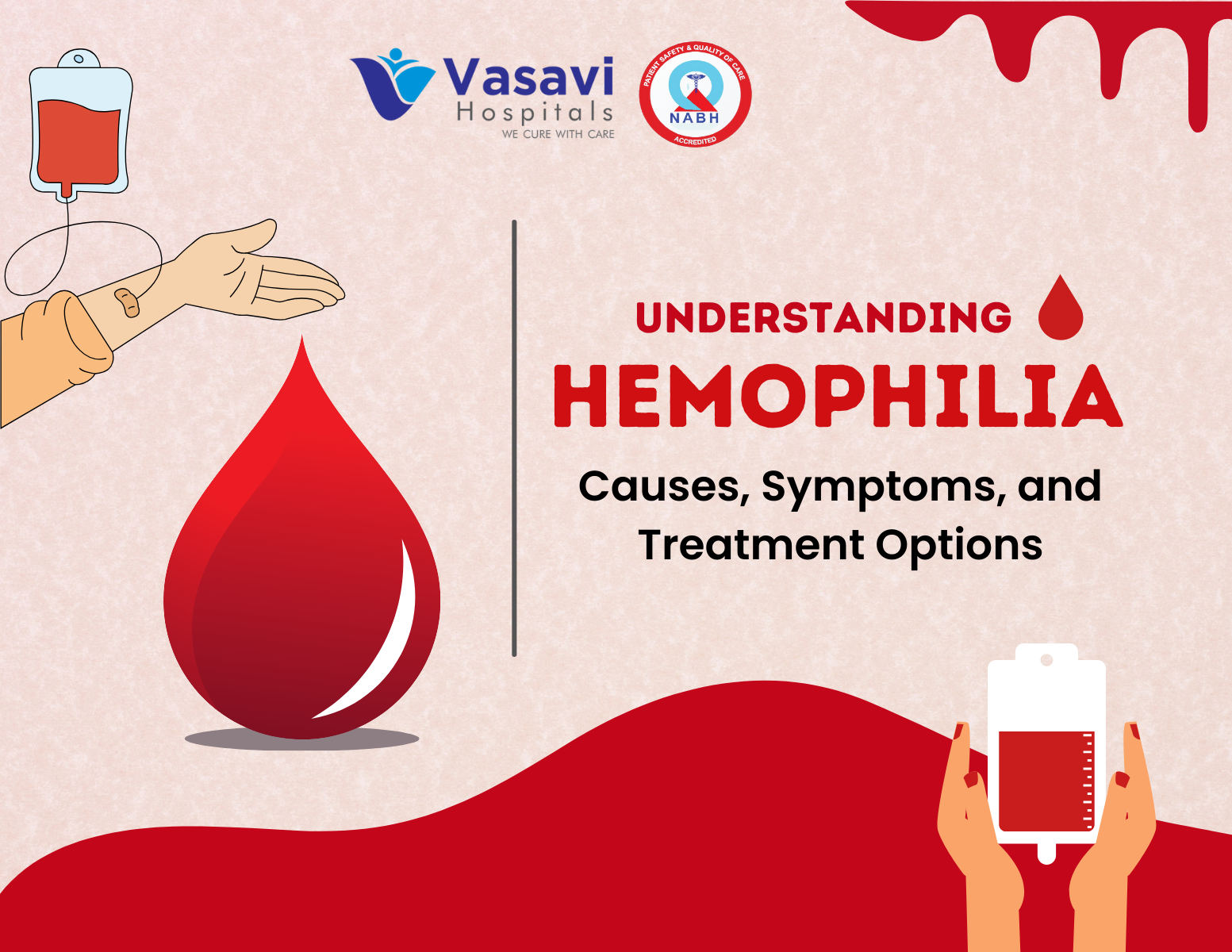Hemophilia is a rare but serious bleeding disorder that affects the blood’s ability to clot properly. Individuals with hemophilia either lack or have insufficient levels of clotting factors, which are proteins that help control bleeding. As a result, even minor injuries can lead to excessive bleeding or internal hemorrhaging, making early diagnosis and effective management crucial.
At Vasavi Hospitals, we aim to raise awareness about rare conditions like hemophilia and provide comprehensive care and expert guidance for patients dealing with such complex health issues. In this blog, we will explore the causes, symptoms, and treatment options for hemophilia and guide you on when to seek medical help.
What Causes Hemophilia?
Hemophilia is typically an inherited disorder, meaning it is passed down from parents to children through genes. The two most common types of hemophilia are:
- Hemophilia A: Caused by a deficiency in clotting factor VIII.
- Hemophilia B: Caused by a deficiency in clotting factor IX.
These deficiencies prevent the blood from clotting normally. In rare cases, hemophilia can also be acquired later in life due to autoimmune conditions where the body develops antibodies that attack clotting factors.
Since hemophilia is an X-linked recessive disorder, it primarily affects males, while females usually act as carriers.
Common Symptoms of Hemophilia
Symptoms of hemophilia can vary based on the severity of the disorder. Mild cases may not show any signs until there is significant trauma or surgery. However, moderate to severe cases can exhibit the following symptoms:
- Excessive bleeding from cuts or injuries
- Prolonged bleeding after surgery or dental work
- Frequent nosebleeds without obvious cause
- Easy bruising
- Blood in urine or stool
- Swelling and pain in joints (especially knees, elbows, and ankles) due to internal bleeding
If you or a loved one experiences any of these symptoms, it’s crucial to consult a medical expert. You can rely on a general physician in Kumaraswamy Layout at Vasavi Hospitals to guide you through the initial diagnosis and recommend further evaluation by a specialist if needed.
Diagnosing Hemophilia
Diagnosis typically involves a physical exam and detailed medical history, followed by blood tests that measure the levels of clotting factors in the blood. Family history also plays a significant role, especially if there is a known case of hemophilia.
Early diagnosis is essential to prevent complications and manage the disorder effectively. If you’re looking for comprehensive diagnostic services, the best hospital near Kumaraswamy Layout offers state-of-the-art laboratory facilities and a team of experienced physicians.
Treatment Options for Hemophilia
While there is currently no cure for hemophilia, treatment focuses on managing symptoms and preventing bleeding episodes. Some of the most effective treatment options include:
1. Replacement Therapy
This involves regular infusions of the missing clotting factors. Depending on the severity, it can be done on a regular basis or only during bleeding episodes.
2. Desmopressin (DDAVP)
This synthetic hormone is effective in treating mild cases of Hemophilia A. It stimulates the release of stored factor VIII into the bloodstream.
3. Antifibrinolytic Medicines
These drugs help prevent clots from breaking down, particularly useful in controlling bleeding in the mouth or following dental procedures.
4. Gene Therapy (Emerging Option)
Gene therapy aims to introduce correct versions of defective genes responsible for hemophilia. While still in clinical trials, it holds promise for long-term solutions.
5. Physical Therapy
For patients with joint damage due to repeated internal bleeding, physical therapy can help improve mobility and reduce pain.
At Vasavi Hospitals, our multidisciplinary team provides individualized care plans to ensure each patient receives the most suitable treatment and monitoring.
Lifestyle Tips for Hemophilia Patients
Managing hemophilia isn’t just about medical treatments; lifestyle choices play a vital role in preventing injuries and maintaining quality of life. Here are some helpful tips:
- Avoid contact sports or high-impact activities
- Use protective gear while exercising or engaging in physical activity
- Practice good dental hygiene to avoid oral bleeding
- Inform all healthcare providers about your condition before any procedure
- Stay up to date with vaccinations, especially Hepatitis A and B
Our team of experts at the best hospital near Kumaraswamy Layout is always available to provide guidance on lifestyle modifications and preventive care for chronic conditions like hemophilia.
When to See a Doctor
Any unexplained bleeding or bruising should be taken seriously. Repeated nosebleeds, prolonged bleeding after minor injuries, or joint swelling without trauma are red flags that require immediate attention. A general physician in Kumaraswamy Layout can be your first point of contact to assess the situation and refer you to a hematologist if necessary.
Final Thoughts
Early intervention not only improves prognosis but also enhances the quality of life for individuals with hemophilia.
Hemophilia is a lifelong condition, but with proper care, education, and support, patients can lead full and active lives. At Vasavi Hospitals, we are committed to providing the best medical expertise, compassionate care, and continuous support for individuals living with chronic conditions like hemophilia.Whether you’re looking for routine health checkups, emergency care, or specialized treatment, trust the best hospital near Kumaraswamy Layout for your family’s healthcare needs. Schedule your consultation with a general physician in Kumaraswamy Layout today and take the first step toward better health.
